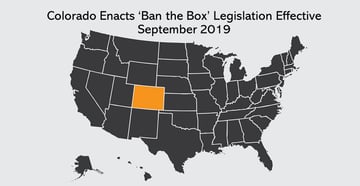 Effective June 6, 2018, Washington will be the next state to implement “ban the box” legislation, which restricts employers from executing a criminal background check on the job applicant during the initial stages of the application process.
Effective June 6, 2018, Washington will be the next state to implement “ban the box” legislation, which restricts employers from executing a criminal background check on the job applicant during the initial stages of the application process.
Governor Jay Inslee signed into law the Washington Fair Chance Act (WFCA) on March 13, 2018. The WFCA prohibits inquiries regarding applicants’ conviction histories until the employer has determined the applicant is “otherwise qualified” for the position. Once the employer has initially determined that the applicant is otherwise qualified, the employer may make further inquiry.
Prohibitions
With few exceptions, all public and private-sector employers in the State of Washington will be prohibited from:
- Advertising openings in a way that excludes people with arrest or conviction records from applying, such as using advertisements that state “no felons,” “no criminal background,” or that otherwise convey similar messages;
- Including any question in an employment application, inquiring orally or in writing, receiving information through a criminal history background check, or otherwise obtaining information about an applicant’s arrest or conviction record, until after the employer has initially determined that the applicant is otherwise qualified for the position;
- Having automatic disqualifiers or categorically disqualifying an individual based a criminal record before initially determining the person is otherwise qualified for the position; or
- Rejecting or disqualifying an applicant for failure to disclose a criminal record prior to initially determining the applicant is otherwise qualified for the position.
Exceptions
The law will not apply to:
- Any employer hiring a person who will or may have unsupervised access to children under the age of 18 or a vulnerable adult or person, as defined by Washington law;
- Any employer, including a financial institution, who is expressly permitted or required under any federal or state law to inquire into, consider, or rely on information about an applicant’s or employee’s criminal record for employment purposes;
- Various law enforcement agencies or criminal justice agencies in Washington;
- Any employer seeking a nonemployee volunteer; or
- Any entity required to comply with the rules or regulations of a self-regulatory organization, as defined by the Securities Exchange Act.
The WFCA is not intended to interfere with or diminish any collective bargaining agreements in unionized workplaces.
Enforcement and Penalties
The WFCA does not provide a private cause of action. Instead, the Washington State Attorney General’s Office has the authority to investigate possible violations law and assess fines, including penalties, costs, and attorneys’ fees.
The maximum penalties are as follows: a notice of violation for the first violation; a fine of $750 for the second violation; and a fine of $1,000 for each subsequent violation.
Local Ordinances
The statewide WFCA does not preempt Washington municipalities from enforcing their own ban-the-box ordinances. Currently, Seattle’s Fair Chance Employment Ordinance and Spokane’s Fair Chance Hiring Act are the only two ordinances in Washington. (For more on the Spokane ordinance, which goes into effect June 14, 2018, see our article, Ban-the-Box Laws in Spokane, Washington, and Kansas City, Missouri.)
***
The WFCA does not specifically address the steps following disclosure of a conviction after the “otherwise qualified” stage. Employers, however, should keep in mind their obligations under the Fair Credit Reporting Act if they plan to obtain criminal history reports from third-party vendors. Employers also should follow best practices, such as engaging in an individualized assessment of any disclosed criminal history prior to making any employment decisions.
Ban-the-box ordinances affect many parts of the hiring and employment process. All covered employers should review and revise as necessary their background checks, hiring practices, application forms, checklists, policies, and procedures to ensure compliance. Employers also should provide periodic training updates to employees.
~This article was written by Jackson Lewis P.C. and was first published on JDSupra.com.



